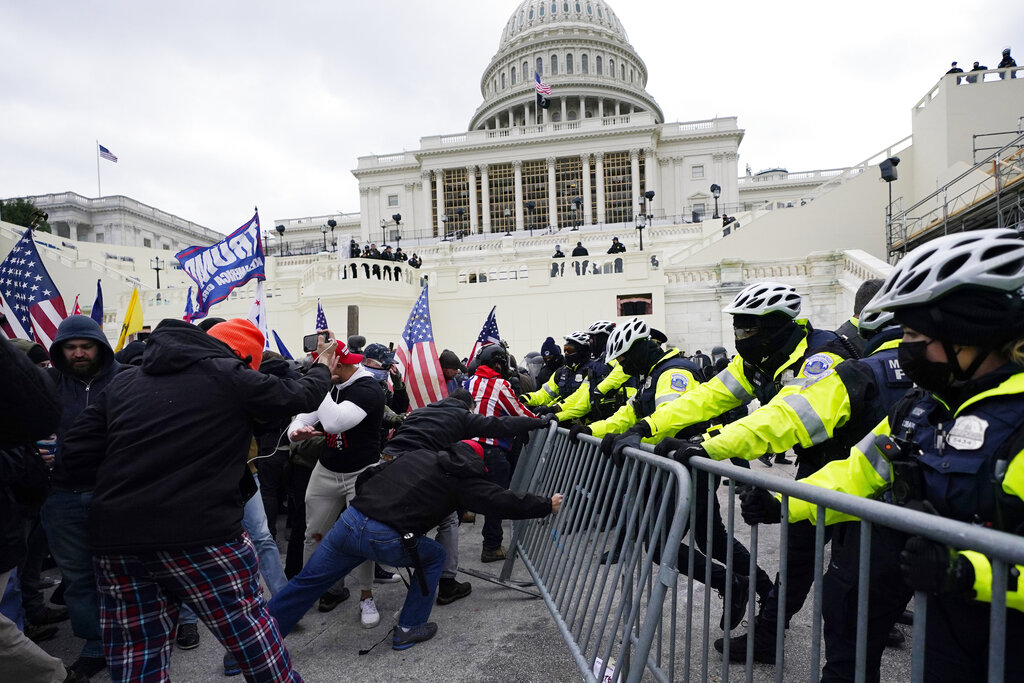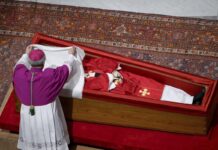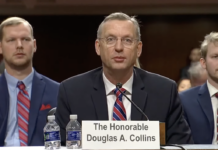
WASHINGTON (AP) — Top House and Senate leaders will present law enforcement officers who defended the U.S. Capitol on Jan. 6, 2021, with Congressional Gold Medals on Tuesday, awarding them Congress’s highest honor nearly two years after they fought with former President Donald Trump’s supporters in a brutal and bloody attack.
To recognize the hundreds of officers who were at the Capitol on Jan. 6, the medals will be placed in four locations — at U.S. Capitol Police headquarters, the Metropolitan Police Department, the Capitol and the Smithsonian Institution. President Joe Biden said when he signed the legislation last year that a medal will be placed at the Smithsonian museum “so all visitors can understand what happened that day.”
The ceremony in the Capitol Rotunda comes as Democrats, just weeks away from losing their House majority, race to finish a nearly 18-month investigation of the insurrection. Democrats and two Republicans conducting the probe have vowed to uncover the details of the attack, which came as Trump tried to overturn his election defeat and encouraged his supporters to “fight like hell” in a rally just before the congressional certification.
Awarding the medals will be among House Speaker Nancy Pelosi’s last ceremonial acts as she prepares to step down from leadership. When the bill passed the House more than a year ago, she said the law enforcement officers from across the city defended the Capitol because they were “the type of Americans who heard the call to serve and answered it, putting country above self.”
“They enabled us to return to the Capitol,” and certify Biden’s presidency, she said then, “to that podium that night to show the world that our democracy had prevailed and that it had succeeded because of them.”
Dozens of the officers who fought off the rioters sustained serious injuries. As the mob of Trump’s supporters pushed past them and into the Capitol, police were beaten with American flags and their own guns, dragged down stairs, sprayed with chemicals and trampled and crushed by the crowd. Officers suffered physical wounds, including brain injuries and other lifelong effects, and many struggled to work afterward because they were so traumatized.
Four officers who testified at a House hearing last year spoke openly about the lasting mental and physical scars, and some detailed near-death experiences.
Metropolitan Police Officer Daniel Hodges described foaming at the mouth, bleeding and screaming as the rioters tried to gouge out his eye and crush him between two heavy doors. Metropolitan Police Officer Michael Fanone, who rushed to the scene, said he was “grabbed, beaten, tased, all while being called a traitor to my country.” Capitol Police Officer Harry Dunn said a large group of people shouted the N-word at him as he was trying to keep them from breaching the House chamber.
At least nine people who were at the Capitol that day died during and after the rioting, including a woman who was shot and killed by police as she tried to break into the House chamber and three other Trump supporters who suffered medical emergencies. Two police officers died by suicide in the days that immediately followed, and a third officer, Capitol Police Officer Brian Sicknick, collapsed and later died after one of the rioters sprayed him with a chemical. A medical examiner determined he died of natural causes.
Several months after the attack, in August 2021, the Metropolitan Police announced that two more of their officers who had responded to the insurrection had died by suicide. The circumstances that led to their deaths were unknown.
The June 2021 House vote to award the medals won widespread support from both parties. But 21 House Republicans voted against it — lawmakers who had downplayed the violence and stayed loyal to Trump. The Senate passed the legislation by voice vote, with no Republican objections.
Pelosi, House Republican Leader Kevin McCarthy, Senate Majority Leader Chuck Schumer and Senate Republican Leader Mitch McConnell will attend the ceremony and award the medals. Capitol Police Chief Thomas Manger and Metropolitan Police Department Chief Robert Contee are also expected to attend.
The Congressional Gold Medal, the highest honor Congress can bestow, has been handed out by the legislative branch since 1776. Previous recipients include George Washington, Sir Winston Churchill, Bob Hope and Robert Frost. In recent years, Congress has awarded the medals to former New Orleans Saints player Steve Gleason, who became a leading advocate for people struggling with Lou Gehrig’s disease, and biker Greg LeMond.
Signing the bill at the White House last year, Biden said the officers’ heroism cannot be forgotten.
The insurrection was a “violent attempt to overturn the will of the American people,” and Americans have to understand what happened, he said. “The honest and unvarnished truth. We have to face it.”
___________
By Mary Clare Jalonick, Farnoush Amiri and Lisa Mascaro, Associated Press







